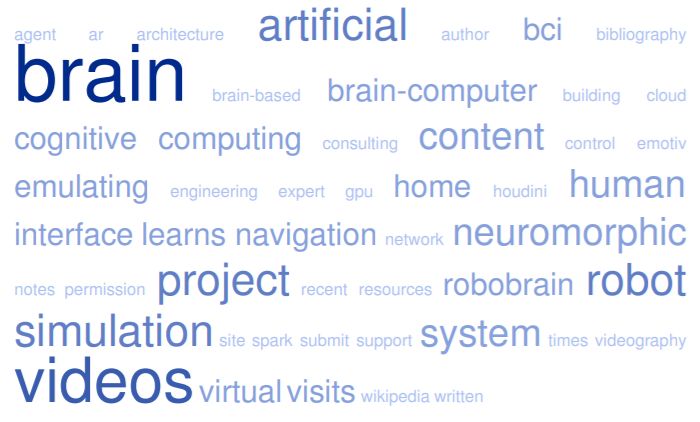
Notes:
In the context of virtual humans, brain-like systems refer to computer-based systems that are designed to simulate the functions of the human brain. These systems can be used to create artificial intelligence (AI) for virtual humans, allowing them to exhibit intelligent behavior and respond to stimuli in a way that is similar to how a human would.
All of these terms are related to the field of artificial intelligence and the development of artificial brains or brain-like systems.
- 3D brain: A 3D brain is a computer-generated model or simulation of a human brain, typically used for research or educational purposes.
- Artificial brain: An artificial brain refers to a machine or computer system that is designed to simulate the functions of a human brain.
- BCI (Brain-Computer Interface): A BCI is a system that allows a person to communicate or control a device using their brain activity.
- Brain emulation: Brain emulation, also known as whole brain emulation or mind uploading, is the idea of creating a digital or computational model of a human brain that is capable of performing the same functions as the original brain.
- Brain projects: Brain projects are research or development efforts that aim to understand the workings of the human brain, or to develop artificial brains or brain-like systems.
- Brain simulation: A brain simulation is a computer-based model or representation of a human brain, typically used for research or educational purposes.
- Neuromorphic computing: Neuromorphic computing is a field of computer science that focuses on developing computing systems that are inspired by the structure and function of the human brain.
- Robobrain: A robobrain is a fictional term that refers to a robot or other machine that has a highly advanced artificial brain, typically allowing it to exhibit intelligent behavior and perform complex tasks.
- Robot brain: A robot brain is a term used to refer to the artificial intelligence system or “brain” that controls the behavior of a robot.
- Synthetic brain: A synthetic brain is an artificial brain or brain-like system that is designed to simulate the functions of a human brain.
- Virtual brain: A virtual brain is a computer-generated model or simulation of a human brain, typically used for research or educational purposes.
Brain-like systems for virtual humans may be based on various approaches, such as machine learning algorithms or neural networks, which are designed to mimic the structure and function of the human brain. These systems may be trained using data from real human brains or may be designed to simulate the functions of the brain in a more abstract way. The ultimate goal of using brain-like systems for virtual humans is to create AI that is capable of exhibiting intelligent behavior and decision-making in a way that is similar to how a human would.
Resources:
- robobrain.me .. large-scale computational system that learns from the internet
Wikipedia:
References:
- Building the first holographic brain ‘atlas’ (08 Nov 2019)
- Neuromorphic and Brain-Based Robots (2011)
See also:
100 Best 3D Brain Videos | 100 Best Artificial Brain Videos | 100 Best Brain Simulation Videos | 100 Best Brainasoft Braina Videos | 100 Best Human Brain Project Videos | 100 Best Robot Brain Videos | BECCA (Brain Emulating Cognitive Control Architecture) | Betty’s Brain Teachable Agent | Cognitive Architecture Meta Guide | Human Brain Project News 2019 | Robot Brains 2017
- Artificial Brains
- Brain Simulation
- Brain-Computer Interface Games
- Brain-Computer Interface Meta Guide
- Emotiv BCI & Virtual Reality
- Human Brain Project